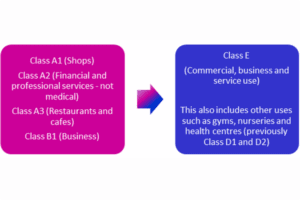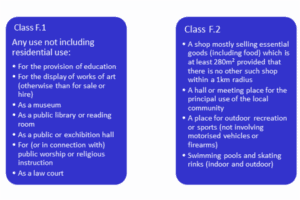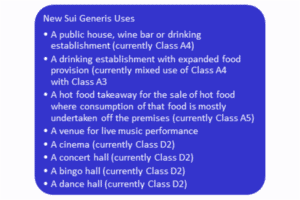Commercial Property
Changes to Use Classes Order 1987 from 1 September 2020
On 30th June 2020, the Government announced its intentions for the ‘most radical’ planning reforms in England since the end of the Second World War. These plans include the new Town and Country Planning (Use Classes) (Amendment) (England) Regulations 2020 which are due to come into force on 1st September 2020.
Background
To appreciate why this is significant, it’s important to remember that the default position is that planning permission is required for the material change in the use of any commercial property; buildings or land (as this constitutes development). However, the current Town and Country Planning (Use Classes) Order 1987 excludes changes of use within the same class from the definition of development meaning that planning permission is not required. The 2020 Regulations significantly amend the existing 1987 Order.
What’s new?
The new Regulations revoke Parts A and D of the Schedule to the Use Classes Order and insert a new Schedule 2 providing for new classes (Class E (Commercial, business and service), Class F.1 (Learning and non-residential institutions) and F.2 (Local community)). Several Uses have also been reclassified as ‘Sui Generis’.
Use Class E (Commercial, business and service use)
Any building or land which is used for one of the following classes on 31 August 2020 will be treated on or after 1 September 2020 as falling within new Class E:
Class B2 (industrial) and B8 (storage and distribution) remain unchanged.
Use Classes F.1 (Learning and non-residential institutions) and F.2 (Local Community)
These new classes replace Class D1 (non-residential institutions) and Class D2 (assembly and leisure).
In a class of their own
Several Uses have been reclassified as ‘Sui Generis’, meaning they are in a class of their own. It’s important to note that these uses are not interchangeable, i.e. one Sui Generis cannot be swapped for another without planning permission.
When will the changes take effect?
Relevant planning applications submitted prior to 1st September 2020 will be determined by reference to the previous use classes. There will then be a transitional period from 1 September 2020 to 31 July 2021 during which a building or use will continue to be subject to the permitted development rights that it was entitled to prior to 31st August 2020. The Government’s explanatory note confirms that these provisions will remain in place until 31st July 2021 when new, revised permitted development rights will be introduced; this also applies to relevant Article 4 Directions.





















Sophie Williams, a Solicitor in our Commercial Property team, said:
“The Regulations aim to make it easier for tenants to change the use of their property without the need to obtain planning permission. This is likely to have a positive impact upon town centres in particular due to the flexibility of new Class E. However, Landlords should be particularly cautious when granting new leases and ensure that the permitted use is limited to the tenant’s particular business. A permitted use of ‘Class E’ will likely be too broad and will reduce their control over their estate management. Likewise, in these uncertain times, a tenant is likely to want to retain the flexibility to change their use during the term if their business isn’t successful. Often there is a solution to suit both parties.”
If you would like assistance negotiating the terms of your lease, please call our Commercial Team on 01708 784000.